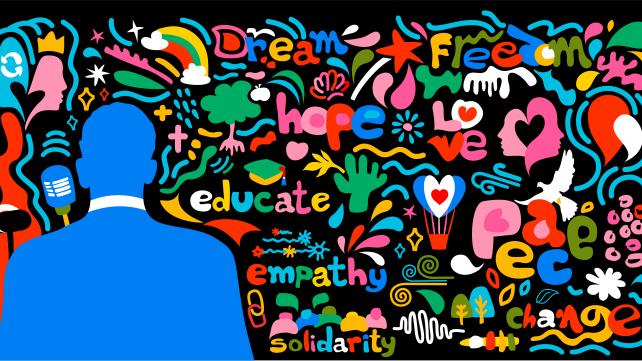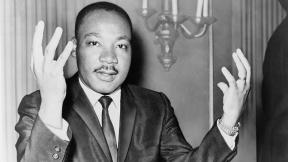
In the United States, the third Monday in January is Martin Luther King Day which is the only federal holiday that is designated as a day of service. Dr. Martin Luther King Jr. fought for racial equality, social justice, economic equality, employment, voting rights, full citizenship and access to safe and affordable housing. The Day of Service is often spent continuing to work towards the complete fulfillment of those goals.
Working towards good is part of Islam. The Quran mentions the reward for good deeds repeatedly. Too often, however, Muslims focus solely on doing good deeds that promote their own personal spiritual development like performing Salah, doing Dhikr (remembrance of God), reading Quran, fasting or giving Zakat. Yet, good deeds in Islam also include brotherhood and sisterhood to our fellow Muslims and service to humanity. We remind ourselves that Prophet Muhammad, God’s peace and blessings be upon him, was not the Messenger for only Muslims, but he was a man who brought a message and example to all of humankind.
The Quran gives us examples of good deeds, many of which we can work towards in our present political and cultural environment.
Treating all of humanity with kindness and respect (Al Nisa: 36)
- America has always struggled with the social constructs of “belonging” and “othering”. Institutionalized racism fueled by the feelings that “I am better than him.” challenges the unification of different ethnic and cultural groups under one country. As Muslims, we are commanded to treat everyone with kindness, and to respect the worth of every human being. We can work towards this goal by examining our own hearts, teaching our children, diversifying our Masjids, contributing to community integration efforts and using the Quran to remind ourselves and others to be compassionate.
“Then will he be of those who believe, and enjoin patience, (constancy, and self-restraint), and enjoin deeds of kindness and compassion” (Surah Balad: 17)
Saving another person’s life (Al Maida: 32)
- The issues of social injustice continue to plague the American conscience and consciousness. The December 2021 Newsweek article “Full List of Black People Killed By Police in 2021” reported that 200 African-Americans were killed by police in 2021, which is 27 percent of those killed by police, even though Black people only make up 13 percent of the U.S. population. The social upheaval of the year before, prompted by the muder of George Floyd by former Minneapolis police officer Derek Chauvin, although important, did not significantly change this institutionalized brutality. Muslims stand firmly against injustice and can work against it by holding those in authority responsible and accountable by community outcry, writing letters for removal of corrupt systems, and making sure that qualified and just people serve as protectors in our community by recruiting them ourselves or ‘being’ them ourselves.
Standing against injustice, even at the cost of exposing ourselves (Al Nisa: 135)
- The capitalist mindset of the American economy promotes an “every man for himself” mindset in the workplace. Some places of employment thrive in a culture of pushing away “the other” and even working against them. This is most often the cultural, religious, or ethnic minority in the room. This is not our way as Muslims, even if we have an economic advantage by doing so. Certainly, Muslims can work as mentors, not only to those just like them, but to all of their co-workers. Volunteering with organizations that help people gain employment benefits not only that particular person, but provides economic strength to the whole community. There is no need for Muslims to feel the need to keep the money and wealth for themselves by ignoring unfair labor practices. Sometimes standing up for justice may make us unpopular, but doing so is most pleasing to Allah, The Most High.
Working towards reconciliation with others (Al Hujaarat: 10)
- After the election of 2020, 19 states passed 33 laws that make it harder for people to vote, thus restricting some Americans’ voices and choices. Laws that shorten voting deadlines, impose strict ID and signature proof requirements, make it illegal to assist a disabled person mailing a ballot, or make it a crime to provide water to thirsty voters waiting in line, are all laws that hamper the cultural and political reconciliation needed in America. Muslims should not be idle and allow laws to be passed that harm us or others. We can work at the grassroots level with organizations that strengthen at-risk populations by advocating for those who ask, and for those who are prevented from asking for our help.
Being charitable and giving freely to others (Al Imran: 92)
- America is a melting pot of racial, cultural, and ethnic communities. The only way we can be united as a country is to make sure that we have fair laws that help immigrants gain citizenship, and fair laws and practices that provide affordable, safe, and decent housing. Muslims can be part of the solution by volunteering with organizations that build housing for the less advantaged, holding police responsible for neighborhood safety, even if the neighborhood is not our own, and ensuring slum lords receive severe penalties by electing judges that hold them accountable.
The key is that Muslims realize the full potential of good deeds and expand “goodness” to include both spiritual and moral connectedness. MLK Day is one day of service, but as Muslims we work towards the goals of helping humanity every day.
Prophet Muhammad, peace and blessings be upon him, said, “Whoever relieves the hardship of a believer in this world, Allah will relieve his hardship on the Day of Resurrection. Whoever helps ease one in difficulty, Allah will make it easy for him in this world and the Hereafter…” (Ṣaḥīḥ Muslim 2699).






Add new comment